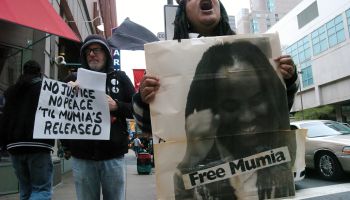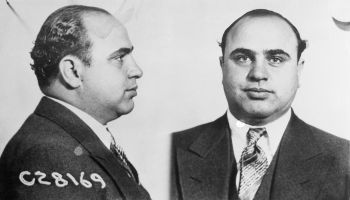It seems unlikely that Mumia Abu-Jamal will have the chance at justice which he deserves.
See Also: 10 Things You Didn’t Know About Mumia Abu-Jamal
A judge decided on Monday to continue the activist’s appeal hearing until August 30, ABC News reported. The former death row inmate has attempted several times before to appeal his conviction. At Monday’s hearing, the judge had to consider whether to vacate those previous failed attempts and grant him another try.
Abu-Jamal’s legal team argues, under Pennsylvania’s Post-Conviction Relief Act, that his rights to appeal conviction were violated by former state Supreme Court Justice Ronald Castille, who was biased in denying Abu-Jamal’s appeals. Castille was the Philadelphia district attorney who argued against Abu-Jamal’s appeals in the high court.
Monday’s hearing came just days after the parole of another former Black activist, Herman Bell, convicted in the 1970s for killing two police officers.
Abu-Jamal, 64, is a former Black Panther and journalist who has always maintained his innocence. A jury convicted him in 1982 for the December 9, 1981 killing of Officer Daniel Faulkner. The jurors found that he shot Faulkner, who was White, several times in a confrontation after the officer pulled over Abu-Jamal’s brother for driving the wrong way on a one-way street. The activist argued that someone else at scene was the actual killer.
After spending 29 years on death row, a judge reduced Abu-Jamal’s sentence to life without parole in 2011. That successful appeal was based on jurors receiving misleading instructions during his initial trial.
To many, Abu-Jamal is a political prisoner. An international movement demands his release. He’s become a symbol for groups protesting for criminal justice system reform. Supporters rallied on Monday to raise awareness about his case.
The attorneys agued that Castille, who is now retired from the bench, should have stepped aside from participating in decisions about appeals in this case. In 2016, the U.S. Supreme Court ruled, in a different case, that Castille should have recused himself from hearing a death penalty case that he oversaw as district attorney.
Judges routinely recuse themselves when there’s a possibility of a conflict of interest. Indeed, U.S. Supreme Court justices recused themselves at least 180 times in the 2016 term, according to the ABA Journal. That number included 33 recusals because justices held stock ownership of companies involved in cases they were hearing.
Debates about whether Abu-Jamal deserves the right to another appeal come against the backdrop of parole officials releasing Bell on Friday, despite the strong objections of New York City’s police union and mayor.
Bell, 70, spent four decades in prison after pleading guilty to the murders of two NYPD officers. Along with two other members of the Black Liberation Army, Bell ambushed the officers outside a Harlem housing project in 1971. All three men were convicted and sentence to 25 years-to-life in prison. The board granted Bell conditional release after his eighth attempt at getting paroled.
SEE ALSO:
Black Police Officer Shot And Killed In His Home
Teenager Killed For Protecting His Little Brother From Bullies
- Sudan: Entertainment, Food, Languages, Places To Visit + More
- Libya: Entertainment, Food, Languages, Places To Visit + More
- Egypt: Entertainment, Food, Languages, Places To Visit + More
- Morocco: Entertainment, Food, Languages, Places To Visit + More
- Tunisia: Entertainment, Food, Languages, Places To Visit + More
Why Mumia Abu-Jamal Won’t Be Granted An Appeal Even Though He Deserves One was originally published on newsone.com















